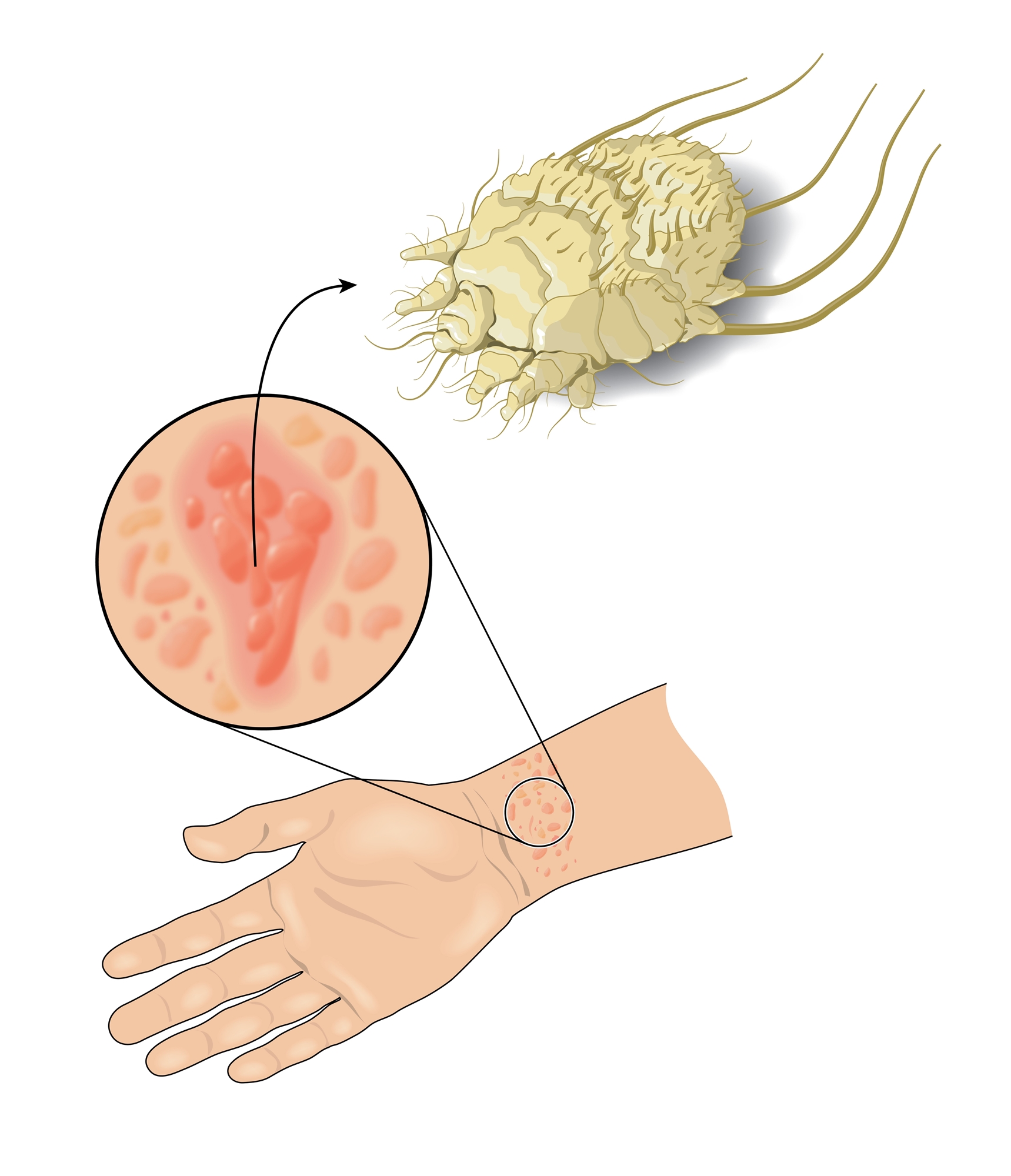What is scabies?
Scabies are caused by the mite Sarcoptes scabiei, which parasitizes on the skin surface, especially in the folds and soft areas of the body, including fingers, toes, shoulder blades, wrists, elbows, armpits, waist, nipples, penis, buttocks, etc.
Those with poor immunity, old age, incapacity and overwork may be infected with crusted scabies (also called Norwegian scabies). The patient will have rashes with thick scabs, containing a large number of mites and eggs; the fatality will not be higher than the general scabies, but because Sarcoptes scabiei are parasitic in large numbers, which may be as many as thousands or even millions, they are highly infectious.

How is it transmitted?
Contact with the skin, clothing, bed or furniture of the patient can be contagious. Sarcoptes scabiei are commonly transmitted among adults through close physical contact. Scabies is very contagious, and the patient should pay special attention to personal hygiene.
Incubation period
Symptoms do not appear until about 2 to 6 weeks after the first infection. For a secondary infection, symptoms will appear in about 1 to 4 days.
Symptoms
Typical symptoms are excessive itching, especially at night. Symptoms such as erythema, papules, and blisters may occur on the skin after infection with Sarcoptes scabiei and due to allergic reactions thereto and their excreta, and sometimes itching and scratching may cause pain and bacterial infection.
Prevention
- Pay attention to personal hygiene.
- Avoid contact with the patient's skin, clothing and bed. A vacuum cleaner is recommended for cleaning the patient's room.
- It is recommended that patients' sexual partners, family members or cohabitants, should receive treatment at the same time in order to avoid mutual transmission.
- Choose a hotel where the sheets and bedclothes are changed daily, especially in areas with poor sanitation.
- It's better to have one bed for one person. If different people use the same bed, it's better to change the sheets and bedclothes.
- Don't let others sleep in your own beds or use their own bedding. Don't borrow clothes from each other.
How to disinfect?
- Underwear, sheets and bedclothes should be ironed with hot water (above 60℃) for 10 minutes or boiled or ironed with an electric iron before being cleaned.
- Sarcoptes scabiei will die 2 to 4 days after leaving the body. Clothes that cannot be cleaned or dry cleaned are sealed in plastic bags for 2 weeks.
- The patient's clothes should be treated separately from those who are not ill, and the high temperature should be continued until the patient stops using drugs.
- Don't mix bedsheets, towels and underwear with others during the onset of the disease.
- During the onset of the disease, do not spend the night in public places (such as hotels, restaurants, duty rooms), or have a sauna.
Treatment and care
- After diagnosis and determination by the physician, use scabicides, and follow the instructions of the doctor and the method of use and precautions labelled.
When daubing medicines, it must be applied all over the body from the neck to the sole of feet, such as the back, buttock crack, perineum, navel, finger, toe, nail, etc. These areas less accessible should be thoroughly smeared, in addition to the itchy parts.
- Itch mites usually dies after being exposed to 50°C for 10 minutes or after leaving the body for 2-3 days. Therefore, the clothes and bed sheets used must be washed with hot water above 60℃ and dried at high heat or dry-cleaned within 3 days before the start of treatment. The clothes that cannot be cleaned or dry-cleaned should be sealed in plastic bags for 1-2 weeks
- The patient's clothes should be cleaned separately from those of other people and treated with high temperature until completed. The room is recommended to be cleaned with a vacuum cleaner.
- After treatment, the symptoms of itching and rashes may last for about one month, even if the itch mites and their eggs have been removed from the skin. The symptoms may be resolved by seeking medical advice and the clinician may prescribe antipruritic drugs to alleviate the symptoms.
- If symptoms such as skin itching or a rash recur 2 to 4 weeks after treatment, please seek professional assistance again.

